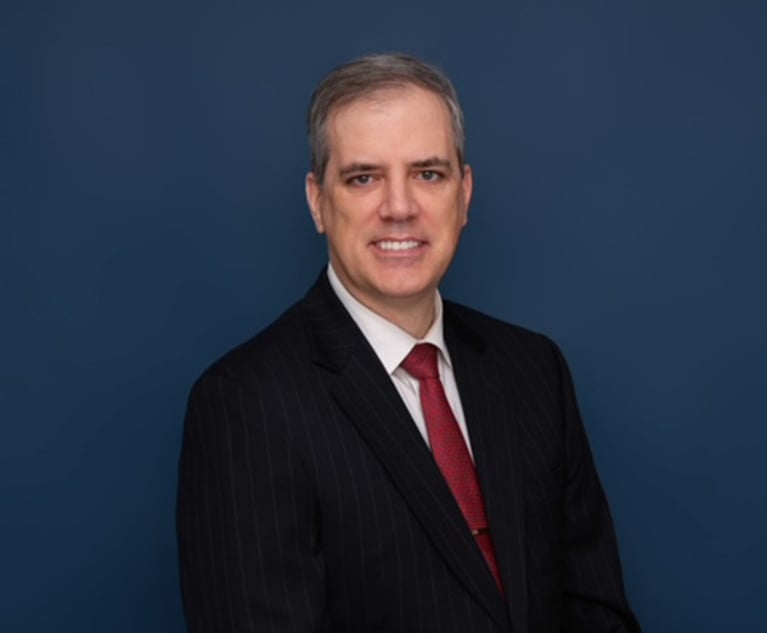Defendants Can't Use MVFRL to Limit Future Medical Expenses, Superior Court Says
Turning to its own unpublished rulings and a pair of Middle District federal court decisions for guidance, the Pennsylvania Superior Court has determined that the Motor Vehicle Financial Responsibility Law's cost containment provision does not cap jury awards for future medical expenses.
November 14, 2019 at 02:34 PM
5 minute read
 Photo: istockphoto / jlgutierrez
Photo: istockphoto / jlgutierrez
Turning to its own unpublished rulings and a pair of Middle District federal court decisions for guidance, the Pennsylvania Superior Court has determined that the Motor Vehicle Financial Responsibility Law's cost containment provision does not cap jury awards for future medical expenses.
In doing so, a three-judge panel of the court ruled 2-1 to uphold a nearly $2.6 million Philadelphia verdict in favor of plaintiff Louis Farese, who was injured when his 1998 Ford Mustang convertible collided with a work truck owned by defendant Venturi Technologies and driven by defendant James Robinson.
In Farese v. Robinson, the panel considered a number of issues raised by the defense, but the MVFRL issue specifically dealt with an unsettled area of Pennsylvania law.
Section 1797 of the MVFRL states that medical providers cannot charge injured insureds more than 110% of what Medicare would pay for comparable services or the provider's usual and customary charge, whichever is less. The law also prohibits medical providers from charging insureds for the difference between their full charge and the amount covered by insurance.
Therefore, the defendants argued, Section 1797 limits the amount of future medical expenses plaintiffs can recover.
But Senior Judge James Gardner Colins, writing for the majority, said the defendants were unable to cite any Pennsylvania case law—and the court itself was unable to find any—supporting the proposition that jury awards for future medical expenses in motor vehicle cases should be molded under Section 1797.
There were, however, a handful of Superior Court memorandum decisions and U.S. District Court for the Middle District of Pennsylvania rulings rejecting that argument, Colins said.
"Upon our review of these cases, we have discovered that, whenever courts have considered the question of whether 75 Pa.C.S. Section 1797 applies to future medical expenses, they have unanimously concluded that it does not," said Colins, joined in the majority by Judge Deborah Kunselman.
The panel found the Middle District court's 2011 ruling in Kansky v. Showman to be particularly instructive.
In that case, the defendants attempted to use Section 1797 to preclude expert testimony about future medical expenses. The parties argued over the definition of the word "payable" in Section 1797(a)'s provision that medical "providers subject to this section may not bill the insured directly but must bill the insurer for a determination of the amount payable."
The federal court ultimately determined that the word "payable" as used in the statute "can have many meanings, such as 'owed, to be paid, due,'" none of which apply to future medical expenses.
"Future medical payments are not currently due and outstanding," the Kansky court said. "The defendants cannot guarantee that any future expenses will in fact be paid. It is merely speculation. For instance, plaintiff's insurer could become bankrupt, or deny future medical bills for a variety of reasons. We agree with the plaintiffs. Because the insurance benefits are not necessarily due and owing at this time and nothing could compel the insurer to pay a lump sum for future expenses, plaintiffs future medical bills are not 'payable' under [Section 1797].'"
"We find the federal court's reasoning to be sound and would likewise find that the Section 1797 does not apply to future medical expenses," Colins said.
The defendants also argued on appeal that the verdict was excessive, but the majority held that "the jury resolved all issues related to damages, and, provided there is any evidence to support the award, it is not for this or any court to substitute its judgment for that of the fact-finder, even if the court would have arrived at a different conclusion on the same facts"
"Appellants knew the dangers and pitfalls of a jury trial when they requested one, and they must accept the consequences thereof," Colins said.
The majority also rejected the defendants' argument that they were entitled to a new trial because of comments plaintiffs counsel made during openings and closings, including telling the jury that the defendants "have a low value for human well-being" and referencing the cost of having to bring litigation.
"The trial court took … affirmative steps to cure any harm by either instantaneously instructing the jury to disregard appellees' comments or by repeatedly offering to issue curative instructions—even allowing appellants to craft the wording of the instructions—but appellants failed to follow through by providing the trial court with any suggested language," Colins said, adding that, while the defendants specifically asked for a mistrial during openings, they never clearly asked for a mistrial during closings and thus waived any right to a new trial based on comments made during closings.
Judge Anne Lazarus, however, issued a strongly worded dissent on this issue.
"First, I do not believe that appellants waived their request for a new trial based upon counsel failing to 'clearly' or 'explicitly' request a mistrial during or after the conclusion of closing argument," Lazarus said. "Second, contrary to the majority's determination that the trial judge's efforts 'extinguished' the 'flames of prejudice' ignited by appellees, I believe that the trial court's lackadaisical attempts to control counsel's conduct hardly cured the harm. Third, appellees' counsel's repeated inflammatory comments, made throughout his opening and closing arguments, prejudiced the fact finder, so much so that even a proper curative instruction would not have 'adequately obliterate[ed] the taint.'"
Counsel for the defendants, Teresa Ficken Sachs of Marshall Dennehey Warner Coleman & Goggin in Philadelphia, declined to comment except to say that her clients are considering their options.
Counsel for the plaintiffs, Alfred V. Altopiedi of Springfield, could not be reached for comment.
This content has been archived. It is available through our partners, LexisNexis® and Bloomberg Law.
To view this content, please continue to their sites.
Not a Lexis Subscriber?
Subscribe Now
Not a Bloomberg Law Subscriber?
Subscribe Now
NOT FOR REPRINT
© 2025 ALM Global, LLC, All Rights Reserved. Request academic re-use from www.copyright.com. All other uses, submit a request to [email protected]. For more information visit Asset & Logo Licensing.
You Might Like
View All

Am Law 100 Lateral Partner Hiring Rose in 2024: Report


Law Firms Mentioned
Trending Stories
- 1Bar Groups Say IOLA Settlement Protects Civil Litigants' Fund From Future 'Raids'
- 2'Every MAGA Will Buy It:' Elon Musk Featured in Miami Crypto Lawsuit
- 3Pennsylvania Law Schools Are Seeing Double-Digit Boosts in 2025 Applications
- 4Meta’s New Content Guidelines May Result in Increased Defamation Lawsuits Among Users
- 5State Court Rejects Uber's Attempt to Move IP Suit to Latin America
Who Got The Work
J. Brugh Lower of Gibbons has entered an appearance for industrial equipment supplier Devco Corporation in a pending trademark infringement lawsuit. The suit, accusing the defendant of selling knock-off Graco products, was filed Dec. 18 in New Jersey District Court by Rivkin Radler on behalf of Graco Inc. and Graco Minnesota. The case, assigned to U.S. District Judge Zahid N. Quraishi, is 3:24-cv-11294, Graco Inc. et al v. Devco Corporation.
Who Got The Work
Rebecca Maller-Stein and Kent A. Yalowitz of Arnold & Porter Kaye Scholer have entered their appearances for Hanaco Venture Capital and its executives, Lior Prosor and David Frankel, in a pending securities lawsuit. The action, filed on Dec. 24 in New York Southern District Court by Zell, Aron & Co. on behalf of Goldeneye Advisors, accuses the defendants of negligently and fraudulently managing the plaintiff's $1 million investment. The case, assigned to U.S. District Judge Vernon S. Broderick, is 1:24-cv-09918, Goldeneye Advisors, LLC v. Hanaco Venture Capital, Ltd. et al.
Who Got The Work
Attorneys from A&O Shearman has stepped in as defense counsel for Toronto-Dominion Bank and other defendants in a pending securities class action. The suit, filed Dec. 11 in New York Southern District Court by Bleichmar Fonti & Auld, accuses the defendants of concealing the bank's 'pervasive' deficiencies in regards to its compliance with the Bank Secrecy Act and the quality of its anti-money laundering controls. The case, assigned to U.S. District Judge Arun Subramanian, is 1:24-cv-09445, Gonzalez v. The Toronto-Dominion Bank et al.
Who Got The Work
Crown Castle International, a Pennsylvania company providing shared communications infrastructure, has turned to Luke D. Wolf of Gordon Rees Scully Mansukhani to fend off a pending breach-of-contract lawsuit. The court action, filed Nov. 25 in Michigan Eastern District Court by Hooper Hathaway PC on behalf of The Town Residences LLC, accuses Crown Castle of failing to transfer approximately $30,000 in utility payments from T-Mobile in breach of a roof-top lease and assignment agreement. The case, assigned to U.S. District Judge Susan K. Declercq, is 2:24-cv-13131, The Town Residences LLC v. T-Mobile US, Inc. et al.
Who Got The Work
Wilfred P. Coronato and Daniel M. Schwartz of McCarter & English have stepped in as defense counsel to Electrolux Home Products Inc. in a pending product liability lawsuit. The court action, filed Nov. 26 in New York Eastern District Court by Poulos Lopiccolo PC and Nagel Rice LLP on behalf of David Stern, alleges that the defendant's refrigerators’ drawers and shelving repeatedly break and fall apart within months after purchase. The case, assigned to U.S. District Judge Joan M. Azrack, is 2:24-cv-08204, Stern v. Electrolux Home Products, Inc.
Featured Firms
Law Offices of Gary Martin Hays & Associates, P.C.
(470) 294-1674
Law Offices of Mark E. Salomone
(857) 444-6468
Smith & Hassler
(713) 739-1250





